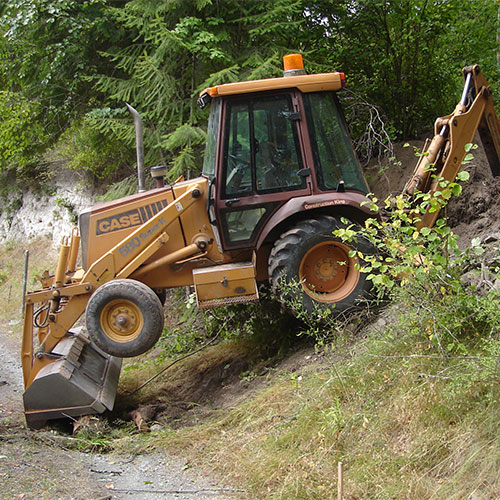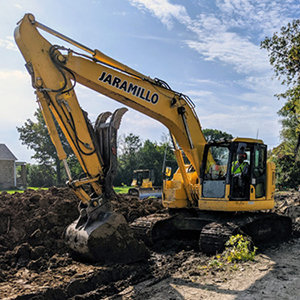Comprehensive Excavation Approaches: Understanding the Basics for Success
In the realm of building and civil engineering, the relevance of effective excavation techniques can not be overemphasized. The cautious preparation, specific execution, and precise attention to detail needed in excavation jobs require an extensive approach that encompasses different essential aspects. From preliminary soil analysis to the application of precaution and normal development surveillance, mastering these core components is necessary for attaining success in any kind of excavation undertaking. The true proficiency exists not simply in comprehending these basics however in seamlessly integrating them to navigate the intricacies of excavation tasks with skill.
Recognizing Excavation Project Planning

The first phase of any type of excavation task is the planning stage, where vital choices are made that can considerably impact the end result of the project. Comprehending the task extent, timeline, and spending plan restrictions is critical for developing an extensive excavation strategy that guarantees the task's success.
One secret facet of excavation task planning is the development of a comprehensive timeline that describes the series of landmarks, due dates, and activities. By carefully taking into consideration all these factors throughout the planning stage, excavation jobs can be implemented efficiently and effectively, leading to successful end results - septic ohio.
Soil Analysis and Website Evaluation
Performing extensive dirt evaluation and website analysis is an essential step in the preparation phase of any kind of excavation job. Dirt evaluation involves figuring out the make-up, structure, and properties of the soil at the excavation website. This info is crucial for recognizing the soil's bearing capacity, wetness material, and possibility for disintegration, which are key consider determining the excavation techniques and tools required for the project.
Website evaluation surpasses soil evaluation and incorporates a more comprehensive assessment of the general website problems. This examination consists of determining any kind of possible risks, such as below ground energies, environmental problems, or unpredictable surface, that could affect the excavation procedure. By completely assessing the website, job managers can create effective excavation strategies that focus on safety and security, efficiency, and environmental management.
Using sophisticated modern technologies like ground-penetrating radar, soil sampling, and drone studies can enhance the precision and performance of soil analysis and site assessment. Investing time and resources in these initial actions can eventually save time and stop expensive hold-ups or issues during the excavation procedure.
Tools Choice and Use
Efficient excavation jobs count greatly on strategic devices selection and usage to make sure optimal efficiency and performance. Selecting the appropriate tools for the task is essential in taking full advantage of efficiency and lessening downtime. Variables such as the kind of soil, deepness of excavation, and task range play a significant function in identifying the most suitable devices for the task available.

Along with choosing the suitable equipment, appropriate usage is essential to project success. Operators has to be educated to handle the equipment securely and efficiently - dump truck companies in ohio. Routine upkeep checks and prompt repair services aid avoid failures and make sure regular efficiency throughout the job
Safety Steps and Regulations Compliance
In the world of excavation jobs, focusing on security steps and conformity with policies is paramount to making sure a safe and secure and lawfully sound functional setting. Safety and security steps include a variety of practices, consisting my explanation of carrying out thorough site assessments, implementing proper signs and obstacles, and providing appropriate safety and security training for all workers entailed in the excavation procedure. Adherence to policies, such as OSHA needs in news the United States, makes certain that the excavation job satisfies the needed requirements to safeguard workers, onlookers, and the surrounding atmosphere.

Surveillance Development and Adjusting Approaches
How can forecast supervisors effectively track the innovation of excavation tasks and adapt their methods appropriately to optimize results? Tracking progression is necessary for making certain that excavation projects remain on track and fulfill target dates. Task supervisors can make use of different tools and strategies to track progress, such as day-to-day report card, regular site inspections, and advanced tracking technologies like drones and GPS tracking systems. By continuously checking the project's innovation, supervisors can determine any potential hold-ups or problems early and take proactive procedures to address them.

Conclusion
Finally, grasping the basics of extensive excavation techniques is necessary for the success of any kind of project. By recognizing job preparation, analyzing dirt and website problems, picking proper equipment, complying with safety laws, and keeping track of progress, job managers can ensure a smooth and efficient excavation process. Implementing these approaches will certainly cause effective end results and minimize prospective additional hints risks or troubles throughout the excavation project.
The initial phase of any type of excavation job is the planning phase, where essential decisions are made that can significantly impact the result of the task. Recognizing the job extent, spending plan, and timeline restrictions is vital for developing a thorough excavation strategy that makes certain the project's success.
Just how can predict managers efficiently track the innovation of excavation tasks and adapt their approaches accordingly to optimize end results? By very closely keeping track of progression and being prepared to adjust methods, job supervisors can enhance the total success of excavation projects.
By recognizing job planning, evaluating dirt and website conditions, picking appropriate equipment, complying with safety regulations, and monitoring progression, job managers can ensure a efficient and smooth excavation procedure.